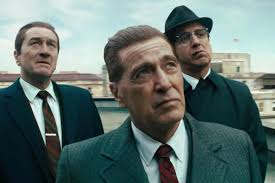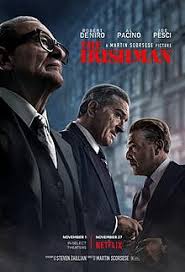Black Holes
- Carol Anne Jones

- Dec 8, 2019
- 3 min read
Updated: Aug 24, 2020
The art form of cinema, this month’s musing.
Martin Scorsese’s epically long gangster drama “The Irishman” was finally recently released on Netflix. I was looking forward to watching this but was taken by surprise, this movie is different from other Scorsese mob movies such as “Goodfellas”. I found it dark. It’s well known that Netflix were brave in choosing to invest in this movie unlike other production companies who thought it was too much of a gamble because the story “belongs” to a bygone era and probably lacked a contemporary audience appeal.
Falling into the organized crime gangster genre, it follows the story of Frank Sheeran, a truck driver who becomes a hitman involved with mobster Russell Bufalino and his crime family. The tempo is calm throughout and illustrates well the rules applied in that historic American mob era: the murky world of gangsters with ice cold blood running through their veins. It’s a male dominated world of deceit, betrayal and extreme violence that few of us folk living regular lives would ever want any involvement with. The characters in the story are all deeply aware of their defence mechanisms and the need to constantly look over their shoulders to ward off danger by continually ‘having to have the upper hand’ in order to survive. The mantra for survival is to “trust no one” and if you don’t get in first, then somebody else will.
Despite this daily reality for the characters the essence of the film is focused on exploring the universal theme of mortality. The film’s focus is Sheeran and his conscience regarding the murder committed by him of a man he admires throughout played by Al Pacino.
For me the hook and underbelly of the story was the character of Sheeran’s daughter Peggy who is mentioned intermittently throughout the story by Sheeran. She doesn’t say much but is a significant silent presence in the film and is introduced as a little girl then adult played by Anna Paquin. She watches, she knows, and she judges. In an early sequence we see Peggy watching in horror while her father brutalises a grocery clerk who had given her lip moments earlier. All that Peggy sees is an extremely violent man with whom she’s expected to share a home with. She neither warms to her father’s associate Russell Bufalino either, likewise a murderer. Peggy remains throughout dedicated to her principles, preferring to live a life where truth, honesty and safety are her constants. She eventually cuts off all contact with her father after a muted confrontation in which she accuses him with the simple “Why?” following the disappearance of union leader Jimmy Hoffa played by Al Pacino, her father’s friend. Peggy having warmed to her father's friend has questions when her father reveals that he has not yet reached out to Hoffa's wife.
"Why?" Peggy asks Frank to which he responds "What?"
"Why?" she asks again
"Why, what?" Frank says.
"Why haven't you called Jo?" she asks.
There is a sense that she is gut wrenchingly traumatised by what she sees, frozen in trauma and disgust to be around someone who pathologically lies about small things, big things and things that don’t need to be lied about, where facts are twisted and turned and lies inserted to make anyone doubt their mental functionality. But Peggy sees through all that and there is a sense of deep mistrust, disrespect, and disconnection with her father.
Yet in Frank’s world pathological lying is as easy as taking the next breath. The criminal mind perceives masking the truth as just a way of life without the need to feel bad or guilty about anything.
Psychologist’s might say that early on Frank submerged his true self in order to survive and recreated himself as someone else, a false self, a fictitious character constantly looking for outside validation, constantly in denial thus avoiding the all-consuming defective black hole inside himself. His conscience. There is a sense of the nothingness that is always threatening to eat him alive.
In the closing scene, alone with all the characters from his life gone, Sheeran leaves the door of his carehome room slightly ajar and open. As he faces his own mortality, there is nowhere to go other than to face his tortured inner demons. Yet we see by leaving the door slightly open he may be attempting to avoid them and still seeking validation from the outside world.





Comments